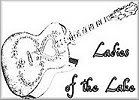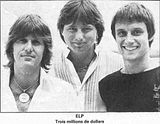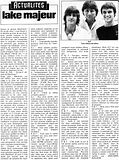Lake Major
Another 10-year old band! Time is flying. "Love Beach", ELP's latest record, seems to mark the end of a confused period of projects whose monumental aspects could not conceal the weaknesses or even the lack of creativity: the pompous "Brain Salad Surgery", the self-indulgent "Live", the very affected "Works 1" and the incoherent "Works 2" have paved a chaotic way that was full of traps, as we will learn from Greg Lake himself. I don't know if ELP have reached their goal but at least, they don't regret anything.
Rock & Folk: What has become of Manticore?
Greg Lake: We set up Manticore following the huge success we had and the considerable amounts of money we had to manage, thinking that in a certain way other artists could benefit from our financial means and our show-business experience. Then, our career becoming more and more demanding, we realized we couldn't give these artists the time we had wished to give. And we reached a point where it wouldn't have been fair to go on like this. We helped them find new contracts in the best possible conditions and it relieved us from the responsibility of their future without jeopardizing them. We could have kept them and tried to make money by selling our rights, we preferred to release them and dissolve Manticore (as a record label).
Was that before you started your tour with the orchestra?
Nearly at the same time. We knew about the hugeness of the project, but we had thought we could manage it together with Manticore. Then it turned out that touring with a 70-piece orchestra, organizing such an unprecedented event while at the same time composing, arranging, orchestrating the music for the occasion took up all our time.
Why did you have to stop this tour?
We knew that it would be very tough financially, but after having spent 3 million dollars from our own income, we had to be more careful about the places where we could play. It became impossible, for profit reasons, to play in front of less than 50,000 people. In order to finish the film shots and the live recordings, we kept only the largest dates: Montreal Olympic Stadium, 80,000 people - Chicago, 70,000 - New York, 60,000...That's why we couldn't do any concerts in Europe, the expenses were far too big.
Was the orchestra the same everywhere?
Yes, we had 120 people on the road. The music was too specific to use local orchestras. What we were asking for had nothing to do with the traditional classical repertoire, we would have needed to rehearse for 15 days each time. And also, it was all or nothing, we wanted to complete the project. We only stopped when it became risky not only for our money but also for the money of the people who trusted us.
Is it with the same orchestra that you recorded "Works"?
Yes. You can say it was OUR orchestra; we had recruited it ourselves, we had trained it and were paying it. It was a huge cost but we couldn't ask the audience to pay more than if there had only been the three of us. But we don't regret it; after recording our sixth album we felt it necessary to find a new sound.
However, musically speaking, it has been a rather erratic period...
Let's say that we satisfied our wish to play with an orchestra and that we took what we expected out of it. But it has also given us confidence and a knowledge of what we were representing individually and together. The reason why we made "Love Beach" between ourselves is not only economical; we could have recorded a third album with the orchestra (the costs don't come from the recording but from the tour). Finally, after these years of fighting to achieve the orchestra experiment, it was a relief to work freely again, without a conductor, as a rock band.
Ever since "From the beginning", your personal production has always been very different from Emerson's standards...
Keith and I are the two main composers of the group. Keith is a pianist, his emotions are passing through the keyboards. I am a singer, mine pass through songs. What attracts us is very different and that's what makes ELP sound original.
It's also sometimes what makes it sound like anything but a band.
It's maybe a question of taste and also of commercial strategy. We would maybe sell more records if we released in turn an album with songs/an album with piano virtuosity. But ELP is a sum and we prefer to offer together all the music we compose. If it's confusing, too bad...In fact, and that's what we wanted to prove with "Works", ELP is sometimes a band, sometimes one of its individuals. And we are maybe the only band in the world that succeeds to work like this, respecting the identity and the musical tastes of each. Keith doesn't play on "C'est la vie", I don't play on his concerto, but it's still ELP and it widens our possibilities.
At the beginning of your career, you were considered as a pioneering band. It seems that you are back to tradition...
It's because we've had an enormous influence on many groups.
But you are not pioneers any more.
I don't think you can be a pioneer on purpose; it's a mishap of creativity. We haven't started with the wish to become leaders. It's what we have done and the response we have got that made us pioneers. At the beginning, we only wanted to play our music. The main thing is that the motivation is sincere. We have always wanted to create the best possible music in devoting ourselves to the full. We could have produced album after album, all on the same model; on the contrary, we have tried to experiment and have taken risks, including the risk of confusing people...
- ©1979 Rock & Folk. All rights reserved.


